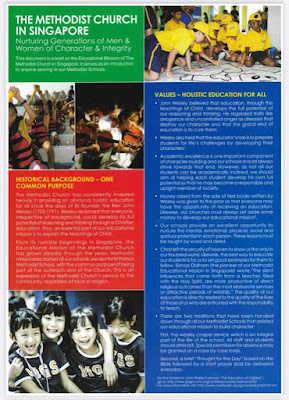‘Be very careful, then, how you live —not as unwise but as wise, making the most of every opportunity, because the days are evil. Therefore do not be foolish, but understand what the Lord’s will is.’ Eph 4:15-17
One of my most
satisfying duties as the chairman of the Dover Park Hospice was to commission a new logo for the hospice. Designed by DP Architects’ creative unit, the
logo features two forms, the Circle of Life and the Dove. The Circle represents
the passage of life, the trials and experiences of life well-lived.
Significantly, the Circle is not enclosed, allowing the Dove to soar free and
take flight, full of hope and dignity. The tagline “Every Moment Matters” is
inspired by the words of Dame Cicely Saunders, founder of the modern hospice
movement.
“You matter because you are you, and you matter to the end of your life.” - Dame Cicely Saunders.
We are familiar with the phrase ‘In God we live and move and have our being.’ In theology, this refers to ‘Coram Deo’, which is Latin for ‘before the face of God.’ Coram Deo, conveys the idea of living one’s entire life in the presence of God, under the authority of God and to the glory of God.
Benjamin
Franklin understood this when he said, "Dost thou love life? Then do not
squander time, for that is the stuff life is made of."
When
we visited the Amish county at Lancashire, Pennsylvania in 1992, I bought a
wooden plaque engraved with an Amish proverb, ‘Ve get too soon oldt and too
late schmardt.’
Consider
the life of Charles Thomas Studd. He established an enduring Christian missionary
society, the World Evangelisation Crusade. Studd
was the son of a wealthy indigo planter and a leading cricketer. He played for
England in the 1882 cricket match between England and Australia which was the
origin of the famous Ashes cricket tournament. Despite the chance to be a famous international sportsman, in February 1885, C.T along
with a group of young men, called the ‘Cambridge Seven’ set sail from England
to become missionaries. They volunteered to serve in China
after attending meetings at Cambridge University, following Hudson Taylor in the
newly established, China Inland Missions.
After more than 10 years service in China C.T. Studd left the country to pastor a church in South India from 1900 to 1906. In 1910 he went to the Sudan and Belgian Congo. In 1913, he started four mission stations and went on to establish the World Evangelism Crusade which today continues to send missionaries to South America, Central Asia and the Middle East as well as Africa.
C.T. gave away a sizeable portion of his family inheritance to help the work of George Muller, D. L. Moody and others on the mission field. At the age of seventy, C.T. Studd died, but his vision for China, India and Africa had expanded to reach the whole world.
He wrote this poem, One Life.
Two little lines I heard one day,
Traveling along life's busy way;
Bringing conviction to my heart,
And from my mind would not depart;
Only one life, 'twill soon be past,
Only what's done for Christ will last.
Only one life, yes only one,
Soon will its fleeting hours be done;
Then, in 'that day' my Lord to meet,
And stand before His Judgment seat;
Only one life, 'twill soon be past,
Only what's done for Christ will last.
Only one life, the still small voice,
Gently pleads for a better choice
Bidding me selfish aims to leave,
And to God's holy will to cleave;
Only one life, 'twill soon be past,
Only what's done for Christ will last.
Only one life, a few brief years,
Each with its burdens, hopes, and fears;
Each with its days I must fulfill,
living for self or in His will;
Only one life, 'twill soon be past,
Only what's done for Christ will last.
When this bright world would tempt me sore,
When Satan would a victory score;
When self would seek to have its way,
Then help me Lord with joy to say;
Only one life, 'twill soon be past,
Only what's done for Christ will last.
Give me Father, a purpose deep,
In joy or sorrow Thy word to keep;
Faithful and true what e'er the strife,
Pleasing Thee in my daily life;
Only one life, 'twill soon be past,
Only what's done for Christ will last.
Oh let my love with fervor burn,
And from the world now let me turn;
Living for Thee, and Thee alone,
Bringing Thee pleasure on Thy throne;
Only one life, 'twill soon be past,
Only what's done for Christ will last.
Only one life, yes only one,
Now let me say, “Thy will be done”;
And when at last I'll hear the call,
I know I'll say "'twas worth it all";
Only one life, 'twill soon be past,
Only what's done for Christ will last
Make the best use of the time we have. There is much good to do with our lives. May the Lord show us the way. Every moment matters.
Lord please show me everyday
As you're teaching me your way
That you do just what you say
In your time
In your time, in your time
You make all things beautiful
In your time
Lord my life to you I bring
May each song I have to sing
Be to you a lovely thing
In your time
Lord please show me everyday
As you teaching me your way
That you do just what you say
In your time
Lord my life to you I bring
May each song I have to sing
Be to you a lovely thing
In your time
Be to you a lovely thing
In your time
Lionel
Updated 1st Published Jul 2012











